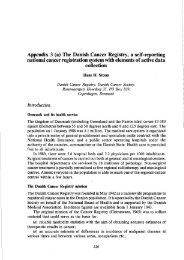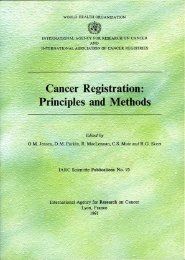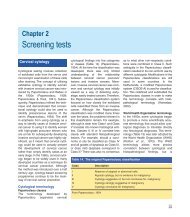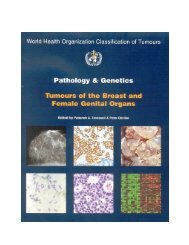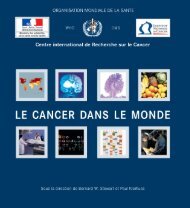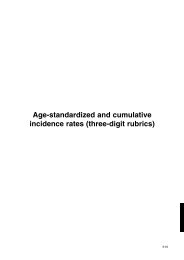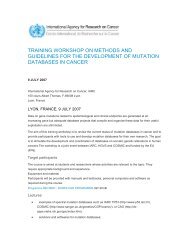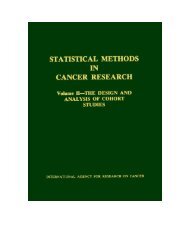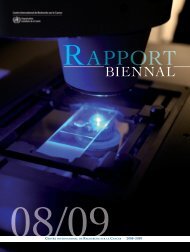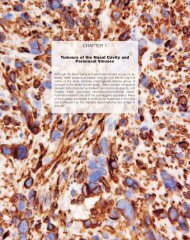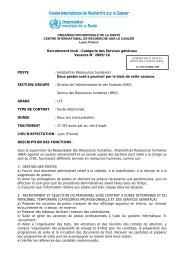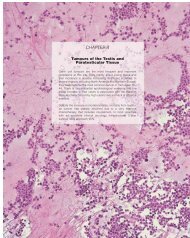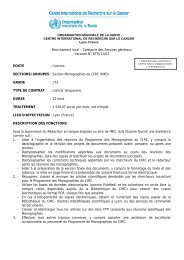world cancer report - iarc
world cancer report - iarc
world cancer report - iarc
Create successful ePaper yourself
Turn your PDF publications into a flip-book with our unique Google optimized e-Paper software.
Fig. 4.39 Poster designed for an annual Prostate<br />
Cancer Awareness Week in the USA.<br />
decrease in prostate <strong>cancer</strong> mortality has<br />
been recognized in countries where PSA<br />
was widely used in screening different<br />
REFERENCES<br />
1. Denis L, Mettlin C, Carter HB, De Koning HJ, Fourcade<br />
R, Fournier G, Hugosson J, Koroltchouk V, Moul J,<br />
Stephenson R (2000) Early detection and screening. In:<br />
Murphy GP, Khoury, S Partin, A Denis L, eds, Prostate<br />
Cancer, Paris, SCI, 221-233.<br />
2. Standaert B, Denis L (1997) The European Randomized<br />
Study of Screening for Prostate Cancer: an update. Cancer,<br />
80: 1830-1834.<br />
3. Catalona WJ, Smith DS, Ratliff TL, Dodds KM, Coplen<br />
DE, Yuan JJ, Petros JA, Andriole GL (1991) Measurement of<br />
prostate-specific antigen in serum as a screening test for<br />
prostate <strong>cancer</strong>. N Engl J Med, 324: 1156-1161.<br />
4. Morgan TO, Jacobsen SJ, McCarthy WF, Jacobson DJ,<br />
McLeod DG, Moul JW (1996) Age-specific reference ranges<br />
for prostate-specific antigen in black men. N Engl J Med,<br />
335: 304-310.<br />
5. Stephan C, Jung K, Lein M, Sinha P, Schnorr D, Loening<br />
SA (2000) Molecular forms of prostate-specific antigen and<br />
human kallikrein 2 as promising tools for early diagnosis of<br />
prostate <strong>cancer</strong>. Cancer Epidemiol Biomarkers Prev, 9:<br />
1133-1147.<br />
162 Prevention and screening<br />
cohorts of men. The decrease in mortality<br />
has become a major subject of discussion.<br />
A community-based randomized trial in<br />
Quebec suggested a mortality decrease of<br />
69% in screened men, which provoked comment<br />
to the effect that a correct analysis by<br />
intention to treat showed no benefit [9].<br />
There is a general expectation that the earlier<br />
detection of prostate <strong>cancer</strong> inevitably<br />
provides a unique chance for cure. The<br />
understanding of “cure”, however, must<br />
include assessment of the quality of life<br />
experienced by the patient. Compli- cations<br />
currently inherent in the management of<br />
prostate <strong>cancer</strong> include those associated<br />
with procedures for diagnosis and treatment,<br />
the clear prevalence of over-diagnosis<br />
and the lack of any consensus on the appropriate<br />
treatment. Ultimately, resolution of<br />
many of these matters can only be achieved<br />
on the basis of the results of randomized<br />
controlled trials.<br />
A multinational controlled trial in Europe<br />
has recruited 180,000 men randomized<br />
between diagnosis and treatment in<br />
6. Chang SS, Gaudin PB, Reuter VE, Heston WD (2000)<br />
Prostate-specific membrane antigen: present and future<br />
applications. Urology, 55: 622-629.<br />
7. Parkin DM, Bray FI, Devesa SS (2001) Cancer burden<br />
in the year 2000. The global picture. Eur J Cancer, 37 Suppl<br />
8: S4-66.<br />
8. von Eschenbach A, Ho R, Murphy GP, Cunningham M,<br />
Lins N (1997) American Cancer Society guidelines for the<br />
early detection of prostate <strong>cancer</strong>: update, June 10, 1997.<br />
Cancer, 80: 1805-1807.<br />
9. Mettlin C (2000) Screening and early treatment of<br />
prostate <strong>cancer</strong> are accumulating strong evidence and<br />
support. Prostate, 43: 223-224.<br />
10. The International Prostate Screening Trial Evaluation<br />
Group (1999) Rationale for randomised trials of prostate<br />
<strong>cancer</strong> screening. Eur J Cancer, 35: 262-271.<br />
11. Cookson MM (2001) Prostate <strong>cancer</strong>: screening and<br />
early detection. Cancer Control, 8: 133-140.<br />
screened men versus controls. In the<br />
USA, 74,000 men have been enrolled in a<br />
large controlled trial of screening for<br />
prostate, colorectal and other <strong>cancer</strong>s.<br />
Collaboration between researchers concerned<br />
with these two trials has led to<br />
the development of the International<br />
Prostate Screening Trial Evaluation<br />
Group. The strength of the prospective<br />
planning and coordinated quality control<br />
will provide a sound basis for the scientific<br />
evidence required to answer the<br />
questions posed on the need for large<br />
population-based screening [10]. Currently,<br />
despite more than a decade of<br />
PSA-based screening, the impact of<br />
screening on mortality due to prostate<br />
<strong>cancer</strong> continues to be controversial,<br />
although some evidence of a decline in<br />
age-adjusted mortality rates for prostate<br />
<strong>cancer</strong> may be attributable, at least in<br />
part, to screening [11].<br />
WEBSITE<br />
Preventing and detecting prostate <strong>cancer</strong> (NCI):<br />
http://www3.<strong>cancer</strong>.gov/prevention/spec_<strong>cancer</strong>.html#<br />
prostate



